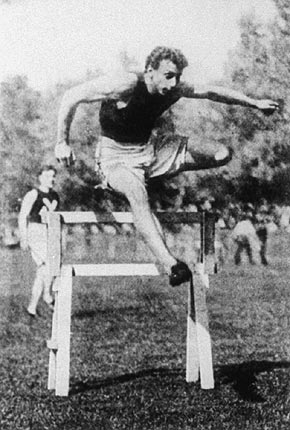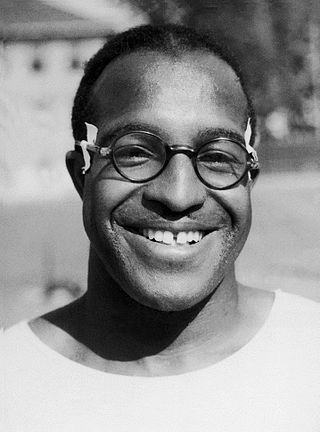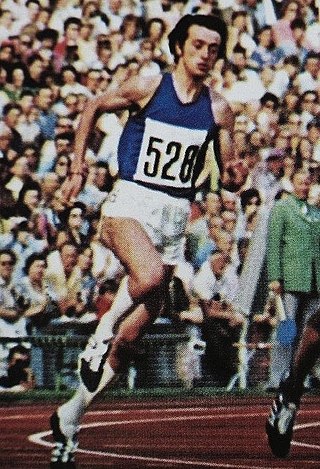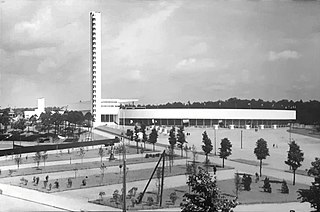
The men's 200 metres at the 2004 Summer Olympics as part of the athletics program was held at the Athens Olympic Stadium from August 24 to 26. There were 54 competitors from 41 nations. The event was won by 0.22 seconds by Shawn Crawford of the United States, the nation's 17th victory in the men's 200 metres after missing the podium entirely four years prior. His teammates Bernard Williams (silver) and Justin Gatlin (bronze) completed the sixth American sweep in the event and first since 1984.
The men's 100 metres was the shortest of the sprint races at the 1908 Summer Olympics in London. The competition was held over the course of three days. The first round was held on 20 July, the semifinals on 21 July, and the final on 22 July. NOCs could enter up to 12 athletes, The event was won by Reggie Walker of South Africa, the first time the gold medal went to a nation other than the United States. The Americans did stay on the podium with James Rector's silver medal. Canada won its first medal in the event, a bronze by Robert Kerr.

The men's 200 metre race was held for the third time at the 1908 Summer Olympics in London. The competition was held from 21 to 23 July 1908. NOCs could enter up to 12 athletes. 43 sprinters from 15 nations competed. The event was won by Robert Kerr of Canada, the first win by a nation other than the United States. Americans took silver and bronze, with Cartmell becoming the first person to win multiple 200 metres medals after taking earning silver in 1904.

The men's 400 metres hurdles was the longer of two hurdling events at the 1908 Summer Olympics in London. It was the third time the event had been featured at the Olympics. The Olympic record was beat three times in the course of the Games. The competition was held from Monday, July 20, 1908, to Wednesday, July 22, 1908. 15 runners from six nations competed. NOCs could enter up to 12 athletes. The event was won by Charles Bacon of the United States, defeating teammate and defending champion Harry Hillman by 0.3 seconds in the final. It was the third gold medal in three Games for the American team in the event. Hillman was the first man to earn multiple medals in the 400 metres hurdles. Jimmy Tremeer of Great Britain earned bronze, the first medal for the nation in the men's 400 metres hurdles.

The men's 60 metres was the shortest of the track races at the 1900 Summer Olympics in Paris, which was the first time the event was held. It was held on 15 July 1900. 10 athletes from 6 nations competed. Five preliminary heats were scheduled, though only two were actually held. The top two athletes from each of the heats advanced to the final, resulting in a final race that featured three United States runners and an Australian. Hurdle specialist Alvin Kraenzlein of the United States won the event, with his countryman Walter Tewksbury in second and Australian Stan Rowley earning bronze.

The men's 100 metres was a sprinting event on the athletics programme at the 1900 Summer Olympics in Paris. It was held on July 14, 1900. 20 athletes from nine nations competed. The event was won by Mathew Chay Bender of the United States, the second of three straight gold medals by different Americans in the event. Australia medaled in the event for the first time, a bronze by Stan Rowley.

The men's 200 metres was a sprinting event on the athletics programme at the 1900 Summer Olympics in Paris. It was held on July 22, 1900, well after most of the rest of the athletics events. The 1900 Games were the first time the 200 metres was contested. The races were held on a track of 500 metres in circumference. Eight athletes from seven nations competed. The event was won by Walter Tewksbury of the United States. Norman Pritchard of India took silver while Australian Stan Rowley earned bronze.

The men's 200 metres hurdles was a hurdling event on the athletics programme at the 1900 Summer Olympics in Paris. It was held on July 16, 1900. 11 athletes from five nations competed in the middle of the three hurdling events. The event was won by Alvin Kraenzlein of the United States, earning his fourth individual gold in athletics in one Games—a record that still stands as of the 2016 Games. The silver medal went to Norman Pritchard of India, while another American earned bronze.

The men's 200 metres was the second-shortest of the men's track races in the Athletics at the 1964 Summer Olympics program in Tokyo. 63 athletes from 48 nations entered, with 6 not starting in the first round. The maximum number of athletes per nation had been set at 3 since the 1930 Olympic Congress. The first two rounds were held on 16 October, with the semifinals and the final on 17 October. The event was won by 0.2 seconds by Henry Carr of the United States, the nation's 11th victory in the event. Fellow American Paul Drayton took silver; it was the fifth time in six Games that the United States had the top two finishers. Edwin Roberts gave Trinidad and Tobago its first medal in the men's 200 metres with his bronze.

The men's 200 metres was a track and field athletics event held as part of the Athletics at the 1912 Summer Olympics programme. It was the fourth appearance of the event, which has appeared at every edition of the Summer Olympics since the 1900 Summer Olympics. The competition was held on July 10, 1912, and on July 11, 1912. 61 runners from 19 nations competed. NOCs could enter up to 12 athletes. The event was won by Ralph Craig of the United States, the nation's third victory in four Games. Another American, Donald Lippincott, took silver. Great Britain earned its first medal in the 200 metres with Willie Applegarth's bronze.

The men's 200 metres sprint event at the 1932 Summer Olympics took place on August 2 and August 3 at the Los Angeles Memorial Coliseum. There were 25 athletes from 13 nations. The 1930 Olympic Congress in Berlin had reduced the limit from 4 athletes per NOC to 3 athletes. After missing the podium entirely in 1928, the United States swept the medals in the event in 1932. It was the second medal sweep in the event by the United States, as well as the nation's sixth victory in eight Games. Eddie Tolan won gold by 0.2 seconds, with George Simpson winning silver and Ralph Metcalfe winning bronze.

The men's 60 metres was a track and field athletics event held as part of the Athletics at the 1904 Summer Olympics programme. It was the second and last time the event was held at the Olympics. 12 athletes from 3 nations participated. The competition was held on August 29, 1904. The event was won by Archie Hahn of the United States, with William Hogenson second and Clyde Blair third as the host nation swept the medals. It was the first of three gold medals in the sprints won by Hahn in 1904.

The men's 100 metres was a track and field athletics event held as part of the Athletics at the 1904 Summer Olympics programme. 11 athletes from 3 nations participated. The competition was held on September 3, 1904. The event was won by Archie Hahn of the United States, completing his sprint trifecta and marking the third straight gold medal in the event by an American. Hahn would later repeat his win in the now-unofficial 1906 Intercalated Games. The United States swept the medals.

The men's 200 metres event was part of the track and field athletics programme at the 1920 Summer Olympics. The competition was held on Thursday, August 19, 1920, and on Friday, August 20, 1920. Forty-eight sprinters from 22 nations competed. Nations were limited to 4 athletes each, down from the 12 allowed in previous Games. The event was won by Allen Woodring of the United States, the nation's second consecutive victory in the event and fourth in five Games. Fellow American Charley Paddock took silver. Great Britain reached the podium for a second consecutive Games with Harry Edward's bronze.

The men's 200 metres was an event at the 1980 Summer Olympics in Moscow. The competition was held on July 27, 1980, and on July 28, 1980. There were 57 competitors from 37 nations. The maximum number of athletes per nation had been set at three since the 1930 Olympic Congress. The event was won by 0.02 seconds by Pietro Mennea of Italy, the nation's first victory in the event since 1960 and second overall. This winning margin remains the narrowest in this event at the Olympics since the introduction of fully automatic timing. Great Britain earned its first medal in the men's 200 metres since 1928 with Allan Wells' silver. Don Quarrie of Jamaica, the defending champion, took bronze. Mennea and Quarrie were the fifth and sixth men to earn multiple medals in the event.

The men's 200 metres event was part of the track and field athletics programme at the 1924 Summer Olympics. The first two rounds were held on 8 July, with the semifinals and final on 9 July. Sixty-five sprinters from 33 countries competed. Nations were limited to 4 athletes each. The event was won by 0.1 seconds by Jackson Scholz of the United States, the nation's third consecutive victory in the event and fifth in six Games. For the third straight Games, the podium consisted of two Americans winning gold and silver and a Briton taking bronze. Paddock, the silver medalist in 1920 as well, was the second man to earn multiple medals in the 200 metres.

The men's 200 metres sprint event at the 1936 Olympic Games took place between August 4 and August 5. There were 44 athletes from 22 nations competing. The maximum number of athletes per nation had been set at 3 since the 1930 Olympic Congress. The final was won by 0.4 seconds by American Jesse Owens, with silver going to Mack Robinson. Owens thus reached 3 gold medals in 1936, with the sprint relay still to come. The Netherlands earned its first medal in the men's 200 metres with Tinus Osendarp's bronze.

The men's 200 metres sprint event at the 1952 Olympic Games took place between July 22 and July 23. There were 71 competitors from 35 nations. The maximum number of athletes per nation had been set at 3 since the 1930 Olympic Congress. The final was won by 0.16 seconds by American Andy Stanfield. Americans also took silver and bronze as the United States swept the medals in the event for the third time.
The men's 100 metres competition at the 1906 Intercalated Games was held at the Panathenaic Stadium in Athens, Greece from 25 to 27 April. A total of 42 athletes from 13 nations competed in the 100 m event.

The 60 metres at the Summer Olympics was contested at the multi-sport event in 1900 and 1904. Part of the Olympic athletics programme, it is the shortest sprinting event to have featured at the Olympics. The shortest sprinting event on the current programme is the 100 metres. Only men competed in the two years that the event was held.

















